 Xem trên TensorFlow.org Xem trên TensorFlow.org |  Chạy trong Google Colab Chạy trong Google Colab |  Xem trên GitHub Xem trên GitHub |  Tải xuống sổ ghi chép Tải xuống sổ ghi chép |  Xem mô hình TF Hub Xem mô hình TF Hub |
Chuyên mục này sẽ hướng dẫn bạn cách sử dụng mô hình SPICE được tải xuống từ TensorFlow Hub.
sudo apt-get install -q -y timidity libsndfile1
Reading package lists... Building dependency tree... Reading state information... The following packages were automatically installed and are no longer required: linux-gcp-5.4-headers-5.4.0-1040 linux-gcp-5.4-headers-5.4.0-1043 linux-gcp-5.4-headers-5.4.0-1044 linux-gcp-5.4-headers-5.4.0-1049 linux-headers-5.4.0-1049-gcp linux-image-5.4.0-1049-gcp linux-modules-5.4.0-1049-gcp linux-modules-extra-5.4.0-1049-gcp Use 'sudo apt autoremove' to remove them. The following additional packages will be installed: freepats libaudio2 libflac8 libjack-jackd2-0 libogg0 libsamplerate0 libvorbis0a libvorbisenc2 timidity-daemon Suggested packages: nas jackd2 fluid-soundfont-gm fluid-soundfont-gs pmidi The following NEW packages will be installed: freepats libaudio2 libflac8 libjack-jackd2-0 libogg0 libsamplerate0 libsndfile1 libvorbis0a libvorbisenc2 timidity timidity-daemon 0 upgraded, 11 newly installed, 0 to remove and 143 not upgraded. Need to get 31.4 MB of archives. After this operation, 40.4 MB of additional disk space will be used. Get:1 http://asia-east1.gce.archive.ubuntu.com/ubuntu bionic/main amd64 libogg0 amd64 1.3.2-1 [17.2 kB] Get:2 http://asia-east1.gce.archive.ubuntu.com/ubuntu bionic/universe amd64 freepats all 20060219-1 [29.0 MB] Get:3 http://asia-east1.gce.archive.ubuntu.com/ubuntu bionic/main amd64 libaudio2 amd64 1.9.4-6 [50.3 kB] Get:4 http://asia-east1.gce.archive.ubuntu.com/ubuntu bionic/main amd64 libflac8 amd64 1.3.2-1 [213 kB] Get:5 http://asia-east1.gce.archive.ubuntu.com/ubuntu bionic/main amd64 libsamplerate0 amd64 0.1.9-1 [938 kB] Get:6 http://asia-east1.gce.archive.ubuntu.com/ubuntu bionic/main amd64 libjack-jackd2-0 amd64 1.9.12~dfsg-2 [263 kB] Get:7 http://asia-east1.gce.archive.ubuntu.com/ubuntu bionic/main amd64 libvorbis0a amd64 1.3.5-4.2 [86.4 kB] Get:8 http://asia-east1.gce.archive.ubuntu.com/ubuntu bionic/main amd64 libvorbisenc2 amd64 1.3.5-4.2 [70.7 kB] Get:9 http://asia-east1.gce.archive.ubuntu.com/ubuntu bionic-updates/main amd64 libsndfile1 amd64 1.0.28-4ubuntu0.18.04.2 [170 kB] Get:10 http://asia-east1.gce.archive.ubuntu.com/ubuntu bionic/universe amd64 timidity amd64 2.13.2-41 [585 kB] Get:11 http://asia-east1.gce.archive.ubuntu.com/ubuntu bionic/universe amd64 timidity-daemon all 2.13.2-41 [5984 B] Fetched 31.4 MB in 2s (14.5 MB/s) Selecting previously unselected package libogg0:amd64. (Reading database ... 281949 files and directories currently installed.) Preparing to unpack .../00-libogg0_1.3.2-1_amd64.deb ... Unpacking libogg0:amd64 (1.3.2-1) ... Selecting previously unselected package freepats. Preparing to unpack .../01-freepats_20060219-1_all.deb ... Unpacking freepats (20060219-1) ... Selecting previously unselected package libaudio2:amd64. Preparing to unpack .../02-libaudio2_1.9.4-6_amd64.deb ... Unpacking libaudio2:amd64 (1.9.4-6) ... Selecting previously unselected package libflac8:amd64. Preparing to unpack .../03-libflac8_1.3.2-1_amd64.deb ... Unpacking libflac8:amd64 (1.3.2-1) ... Selecting previously unselected package libsamplerate0:amd64. Preparing to unpack .../04-libsamplerate0_0.1.9-1_amd64.deb ... Unpacking libsamplerate0:amd64 (0.1.9-1) ... Selecting previously unselected package libjack-jackd2-0:amd64. Preparing to unpack .../05-libjack-jackd2-0_1.9.12~dfsg-2_amd64.deb ... Unpacking libjack-jackd2-0:amd64 (1.9.12~dfsg-2) ... Selecting previously unselected package libvorbis0a:amd64. Preparing to unpack .../06-libvorbis0a_1.3.5-4.2_amd64.deb ... Unpacking libvorbis0a:amd64 (1.3.5-4.2) ... Selecting previously unselected package libvorbisenc2:amd64. Preparing to unpack .../07-libvorbisenc2_1.3.5-4.2_amd64.deb ... Unpacking libvorbisenc2:amd64 (1.3.5-4.2) ... Selecting previously unselected package libsndfile1:amd64. Preparing to unpack .../08-libsndfile1_1.0.28-4ubuntu0.18.04.2_amd64.deb ... Unpacking libsndfile1:amd64 (1.0.28-4ubuntu0.18.04.2) ... Selecting previously unselected package timidity. Preparing to unpack .../09-timidity_2.13.2-41_amd64.deb ... Unpacking timidity (2.13.2-41) ... Selecting previously unselected package timidity-daemon. Preparing to unpack .../10-timidity-daemon_2.13.2-41_all.deb ... Unpacking timidity-daemon (2.13.2-41) ... Setting up libogg0:amd64 (1.3.2-1) ... Setting up libsamplerate0:amd64 (0.1.9-1) ... Setting up freepats (20060219-1) ... Setting up libvorbis0a:amd64 (1.3.5-4.2) ... Setting up libaudio2:amd64 (1.9.4-6) ... Setting up libflac8:amd64 (1.3.2-1) ... Setting up libjack-jackd2-0:amd64 (1.9.12~dfsg-2) ... Setting up libvorbisenc2:amd64 (1.3.5-4.2) ... Setting up timidity (2.13.2-41) ... Setting up libsndfile1:amd64 (1.0.28-4ubuntu0.18.04.2) ... Setting up timidity-daemon (2.13.2-41) ... Adding group timidity....done Adding system user timidity....done Adding user `timidity' to group `audio' ... Adding user timidity to group audio Done. Processing triggers for man-db (2.8.3-2ubuntu0.1) ... Processing triggers for ureadahead (0.100.0-21) ... Processing triggers for libc-bin (2.27-3ubuntu1.2) ... Processing triggers for systemd (237-3ubuntu10.50) ...
# All the imports to deal with sound datapip install pydub numba==0.48 librosa music21
import tensorflow as tf
import tensorflow_hub as hub
import numpy as np
import matplotlib.pyplot as plt
import librosa
from librosa import display as librosadisplay
import logging
import math
import statistics
import sys
from IPython.display import Audio, Javascript
from scipy.io import wavfile
from base64 import b64decode
import music21
from pydub import AudioSegment
logger = logging.getLogger()
logger.setLevel(logging.ERROR)
print("tensorflow: %s" % tf.__version__)
#print("librosa: %s" % librosa.__version__)
/tmpfs/src/tf_docs_env/lib/python3.7/site-packages/numba/errors.py:137: UserWarning: Insufficiently recent colorama version found. Numba requires colorama >= 0.3.9
warnings.warn(msg)
tensorflow: 2.7.0
/tmpfs/src/tf_docs_env/lib/python3.7/site-packages/pydub/utils.py:170: RuntimeWarning: Couldn't find ffmpeg or avconv - defaulting to ffmpeg, but may not work
warn("Couldn't find ffmpeg or avconv - defaulting to ffmpeg, but may not work", RuntimeWarning)
Tệp đầu vào âm thanh
Bây giờ là phần khó nhất: Ghi lại tiếng hát của bạn! :)
Chúng tôi cung cấp bốn phương pháp để lấy tệp âm thanh:
- Ghi lại âm thanh trực tiếp trong colab
- Tải lên từ máy tính của bạn
- Sử dụng tệp được lưu trên Google Drive
- Tải xuống tệp từ web
Chọn một trong bốn phương pháp dưới đây.
[Chạy cái này] Định nghĩa mã JS để ghi âm thanh trực tiếp từ trình duyệt
RECORD = """
const sleep = time => new Promise(resolve => setTimeout(resolve, time))
const b2text = blob => new Promise(resolve => {
const reader = new FileReader()
reader.onloadend = e => resolve(e.srcElement.result)
reader.readAsDataURL(blob)
})
var record = time => new Promise(async resolve => {
stream = await navigator.mediaDevices.getUserMedia({ audio: true })
recorder = new MediaRecorder(stream)
chunks = []
recorder.ondataavailable = e => chunks.push(e.data)
recorder.start()
await sleep(time)
recorder.onstop = async ()=>{
blob = new Blob(chunks)
text = await b2text(blob)
resolve(text)
}
recorder.stop()
})
"""
def record(sec=5):
try:
from google.colab import output
except ImportError:
print('No possible to import output from google.colab')
return ''
else:
print('Recording')
display(Javascript(RECORD))
s = output.eval_js('record(%d)' % (sec*1000))
fname = 'recorded_audio.wav'
print('Saving to', fname)
b = b64decode(s.split(',')[1])
with open(fname, 'wb') as f:
f.write(b)
return fname
Chọn cách nhập âm thanh của bạn
INPUT_SOURCE = 'https://storage.googleapis.com/download.tensorflow.org/data/c-scale-metronome.wav'
print('You selected', INPUT_SOURCE)
if INPUT_SOURCE == 'RECORD':
uploaded_file_name = record(5)
elif INPUT_SOURCE == 'UPLOAD':
try:
from google.colab import files
except ImportError:
print("ImportError: files from google.colab seems to not be available")
else:
uploaded = files.upload()
for fn in uploaded.keys():
print('User uploaded file "{name}" with length {length} bytes'.format(
name=fn, length=len(uploaded[fn])))
uploaded_file_name = next(iter(uploaded))
print('Uploaded file: ' + uploaded_file_name)
elif INPUT_SOURCE.startswith('./drive/'):
try:
from google.colab import drive
except ImportError:
print("ImportError: files from google.colab seems to not be available")
else:
drive.mount('/content/drive')
# don't forget to change the name of the file you
# will you here!
gdrive_audio_file = 'YOUR_MUSIC_FILE.wav'
uploaded_file_name = INPUT_SOURCE
elif INPUT_SOURCE.startswith('http'):
!wget --no-check-certificate 'https://storage.googleapis.com/download.tensorflow.org/data/c-scale-metronome.wav' -O c-scale.wav
uploaded_file_name = 'c-scale.wav'
else:
print('Unrecognized input format!')
print('Please select "RECORD", "UPLOAD", or specify a file hosted on Google Drive or a file from the web to download file to download')
You selected https://storage.googleapis.com/download.tensorflow.org/data/c-scale-metronome.wav --2021-11-05 11:10:55-- https://storage.googleapis.com/download.tensorflow.org/data/c-scale-metronome.wav Resolving storage.googleapis.com (storage.googleapis.com)... 108.177.97.128, 64.233.189.128, 74.125.203.128, ... Connecting to storage.googleapis.com (storage.googleapis.com)|108.177.97.128|:443... connected. HTTP request sent, awaiting response... 200 OK Length: 384728 (376K) [audio/wav] Saving to: ‘c-scale.wav’ c-scale.wav 100%[===================>] 375.71K --.-KB/s in 0.006s 2021-11-05 11:10:56 (65.4 MB/s) - ‘c-scale.wav’ saved [384728/384728]
Chuẩn bị dữ liệu âm thanh
Bây giờ chúng ta có âm thanh, hãy chuyển đổi nó sang định dạng mong muốn và sau đó nghe nó!
Mô hình SPICE cần đầu vào một tệp âm thanh ở tốc độ lấy mẫu 16kHz và chỉ với một kênh (đơn âm).
Để giúp bạn với phần này, chúng tôi tạo ra một chức năng ( convert_audio_for_model ) để chuyển đổi bất kỳ tập tin wav bạn phải định dạng mong đợi của mô hình:
# Function that converts the user-created audio to the format that the model
# expects: bitrate 16kHz and only one channel (mono).
EXPECTED_SAMPLE_RATE = 16000
def convert_audio_for_model(user_file, output_file='converted_audio_file.wav'):
audio = AudioSegment.from_file(user_file)
audio = audio.set_frame_rate(EXPECTED_SAMPLE_RATE).set_channels(1)
audio.export(output_file, format="wav")
return output_file
# Converting to the expected format for the model
# in all the input 4 input method before, the uploaded file name is at
# the variable uploaded_file_name
converted_audio_file = convert_audio_for_model(uploaded_file_name)
# Loading audio samples from the wav file:
sample_rate, audio_samples = wavfile.read(converted_audio_file, 'rb')
# Show some basic information about the audio.
duration = len(audio_samples)/sample_rate
print(f'Sample rate: {sample_rate} Hz')
print(f'Total duration: {duration:.2f}s')
print(f'Size of the input: {len(audio_samples)}')
# Let's listen to the wav file.
Audio(audio_samples, rate=sample_rate)
Sample rate: 16000 Hz Total duration: 11.89s Size of the input: 190316
Điều đầu tiên, chúng ta hãy nhìn vào dạng sóng của giọng hát của chúng ta.
# We can visualize the audio as a waveform.
_ = plt.plot(audio_samples)
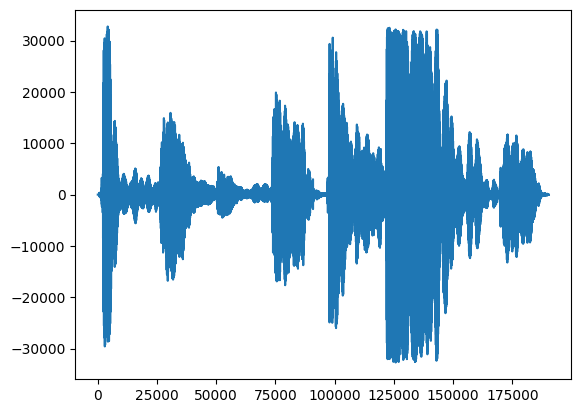
Một hình dung thông tin mới hơn là ảnh phổ , trong đó cho thấy tần số trình bày theo thời gian.
Ở đây, chúng tôi sử dụng thang tần số logarit, để làm cho tiếng hát rõ ràng hơn.
MAX_ABS_INT16 = 32768.0
def plot_stft(x, sample_rate, show_black_and_white=False):
x_stft = np.abs(librosa.stft(x, n_fft=2048))
fig, ax = plt.subplots()
fig.set_size_inches(20, 10)
x_stft_db = librosa.amplitude_to_db(x_stft, ref=np.max)
if(show_black_and_white):
librosadisplay.specshow(data=x_stft_db, y_axis='log',
sr=sample_rate, cmap='gray_r')
else:
librosadisplay.specshow(data=x_stft_db, y_axis='log', sr=sample_rate)
plt.colorbar(format='%+2.0f dB')
plot_stft(audio_samples / MAX_ABS_INT16 , sample_rate=EXPECTED_SAMPLE_RATE)
plt.show()
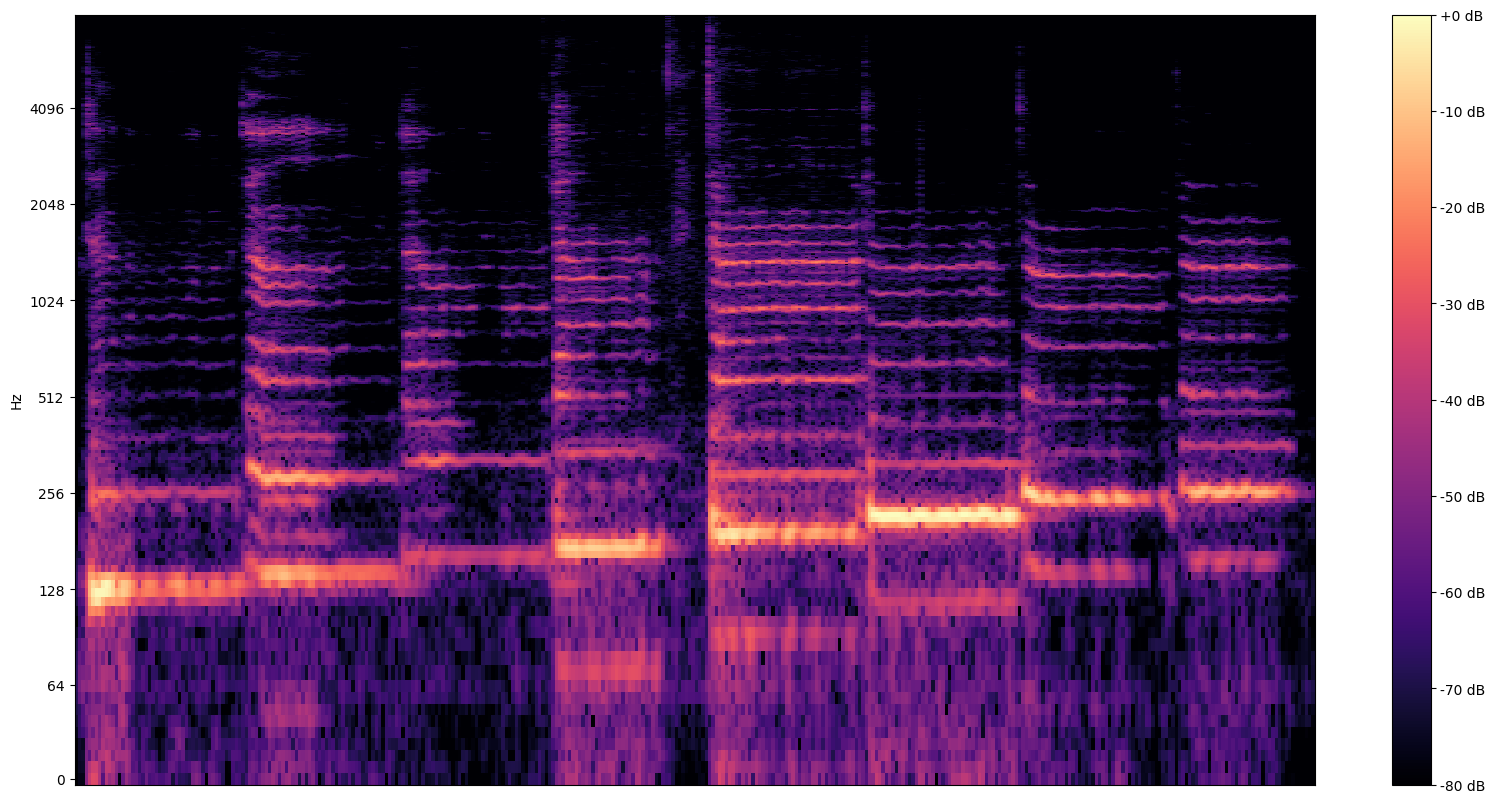
Chúng tôi cần một lần chuyển đổi cuối cùng ở đây. Các mẫu âm thanh có định dạng int16. Chúng cần được chuẩn hóa để nổi giữa -1 và 1.
audio_samples = audio_samples / float(MAX_ABS_INT16)
Thực thi mô hình
Bây giờ là phần dễ dàng, hãy tải các mô hình với TensorFlow Hub, và thức ăn âm thanh để nó. SPICE sẽ cung cấp cho chúng ta hai kết quả đầu ra: cao độ và độ không chắc chắn
TensorFlow Hub là một thư viện cho các ấn phẩm, khám phá và tiêu thụ của các bộ phận tái sử dụng các mô hình học máy. Nó giúp bạn dễ dàng sử dụng máy học để giải quyết các thách thức của mình.
Để tải mô hình, bạn chỉ cần mô-đun Hub và URL trỏ đến mô hình:
# Loading the SPICE model is easy:
model = hub.load("https://tfhub.dev/google/spice/2")
WARNING:tensorflow:Unable to create a python object for variable <tf.Variable 'global_step:0' shape=() dtype=int64_ref> because it is a reference variable. It may not be visible to training APIs. If this is a problem, consider rebuilding the SavedModel after running tf.compat.v1.enable_resource_variables(). WARNING:tensorflow:Unable to create a python object for variable <tf.Variable 'global_step:0' shape=() dtype=int64_ref> because it is a reference variable. It may not be visible to training APIs. If this is a problem, consider rebuilding the SavedModel after running tf.compat.v1.enable_resource_variables(). WARNING:tensorflow:Unable to create a python object for variable <tf.Variable 'encoder/conv2d/kernel:0' shape=(1, 3, 1, 64) dtype=float32_ref> because it is a reference variable. It may not be visible to training APIs. If this is a problem, consider rebuilding the SavedModel after running tf.compat.v1.enable_resource_variables(). WARNING:tensorflow:Unable to create a python object for variable <tf.Variable 'encoder/conv2d/kernel:0' shape=(1, 3, 1, 64) dtype=float32_ref> because it is a reference variable. It may not be visible to training APIs. If this is a problem, consider rebuilding the SavedModel after running tf.compat.v1.enable_resource_variables(). WARNING:tensorflow:Unable to create a python object for variable <tf.Variable 'encoder/batch_normalization/gamma:0' shape=(64,) dtype=float32_ref> because it is a reference variable. It may not be visible to training APIs. If this is a problem, consider rebuilding the SavedModel after running tf.compat.v1.enable_resource_variables(). WARNING:tensorflow:Unable to create a python object for variable <tf.Variable 'encoder/batch_normalization/gamma:0' shape=(64,) dtype=float32_ref> because it is a reference variable. It may not be visible to training APIs. If this is a problem, consider rebuilding the SavedModel after running tf.compat.v1.enable_resource_variables(). WARNING:tensorflow:Unable to create a python object for variable <tf.Variable 'encoder/batch_normalization/beta:0' shape=(64,) dtype=float32_ref> because it is a reference variable. It may not be visible to training APIs. If this is a problem, consider rebuilding the SavedModel after running tf.compat.v1.enable_resource_variables(). WARNING:tensorflow:Unable to create a python object for variable <tf.Variable 'encoder/batch_normalization/beta:0' shape=(64,) dtype=float32_ref> because it is a reference variable. It may not be visible to training APIs. If this is a problem, consider rebuilding the SavedModel after running tf.compat.v1.enable_resource_variables(). WARNING:tensorflow:Unable to create a python object for variable <tf.Variable 'encoder/batch_normalization/moving_mean:0' shape=(64,) dtype=float32_ref> because it is a reference variable. It may not be visible to training APIs. If this is a problem, consider rebuilding the SavedModel after running tf.compat.v1.enable_resource_variables(). WARNING:tensorflow:Unable to create a python object for variable <tf.Variable 'encoder/batch_normalization/moving_mean:0' shape=(64,) dtype=float32_ref> because it is a reference variable. It may not be visible to training APIs. If this is a problem, consider rebuilding the SavedModel after running tf.compat.v1.enable_resource_variables(). WARNING:tensorflow:Unable to create a python object for variable <tf.Variable 'global_step:0' shape=() dtype=int64_ref> because it is a reference variable. It may not be visible to training APIs. If this is a problem, consider rebuilding the SavedModel after running tf.compat.v1.enable_resource_variables(). WARNING:tensorflow:Unable to create a python object for variable <tf.Variable 'global_step:0' shape=() dtype=int64_ref> because it is a reference variable. It may not be visible to training APIs. If this is a problem, consider rebuilding the SavedModel after running tf.compat.v1.enable_resource_variables(). WARNING:tensorflow:Unable to create a python object for variable <tf.Variable 'encoder/conv2d/kernel:0' shape=(1, 3, 1, 64) dtype=float32_ref> because it is a reference variable. It may not be visible to training APIs. If this is a problem, consider rebuilding the SavedModel after running tf.compat.v1.enable_resource_variables(). WARNING:tensorflow:Unable to create a python object for variable <tf.Variable 'encoder/conv2d/kernel:0' shape=(1, 3, 1, 64) dtype=float32_ref> because it is a reference variable. It may not be visible to training APIs. If this is a problem, consider rebuilding the SavedModel after running tf.compat.v1.enable_resource_variables(). WARNING:tensorflow:Unable to create a python object for variable <tf.Variable 'encoder/batch_normalization/gamma:0' shape=(64,) dtype=float32_ref> because it is a reference variable. It may not be visible to training APIs. If this is a problem, consider rebuilding the SavedModel after running tf.compat.v1.enable_resource_variables(). WARNING:tensorflow:Unable to create a python object for variable <tf.Variable 'encoder/batch_normalization/gamma:0' shape=(64,) dtype=float32_ref> because it is a reference variable. It may not be visible to training APIs. If this is a problem, consider rebuilding the SavedModel after running tf.compat.v1.enable_resource_variables(). WARNING:tensorflow:Unable to create a python object for variable <tf.Variable 'encoder/batch_normalization/beta:0' shape=(64,) dtype=float32_ref> because it is a reference variable. It may not be visible to training APIs. If this is a problem, consider rebuilding the SavedModel after running tf.compat.v1.enable_resource_variables(). WARNING:tensorflow:Unable to create a python object for variable <tf.Variable 'encoder/batch_normalization/beta:0' shape=(64,) dtype=float32_ref> because it is a reference variable. It may not be visible to training APIs. If this is a problem, consider rebuilding the SavedModel after running tf.compat.v1.enable_resource_variables(). WARNING:tensorflow:Unable to create a python object for variable <tf.Variable 'encoder/batch_normalization/moving_mean:0' shape=(64,) dtype=float32_ref> because it is a reference variable. It may not be visible to training APIs. If this is a problem, consider rebuilding the SavedModel after running tf.compat.v1.enable_resource_variables(). WARNING:tensorflow:Unable to create a python object for variable <tf.Variable 'encoder/batch_normalization/moving_mean:0' shape=(64,) dtype=float32_ref> because it is a reference variable. It may not be visible to training APIs. If this is a problem, consider rebuilding the SavedModel after running tf.compat.v1.enable_resource_variables(). WARNING:tensorflow:Unable to create a python object for variable <tf.Variable 'global_step:0' shape=() dtype=int64_ref> because it is a reference variable. It may not be visible to training APIs. If this is a problem, consider rebuilding the SavedModel after running tf.compat.v1.enable_resource_variables(). WARNING:tensorflow:Unable to create a python object for variable <tf.Variable 'global_step:0' shape=() dtype=int64_ref> because it is a reference variable. It may not be visible to training APIs. If this is a problem, consider rebuilding the SavedModel after running tf.compat.v1.enable_resource_variables(). WARNING:tensorflow:Unable to create a python object for variable <tf.Variable 'encoder/conv2d/kernel:0' shape=(1, 3, 1, 64) dtype=float32_ref> because it is a reference variable. It may not be visible to training APIs. If this is a problem, consider rebuilding the SavedModel after running tf.compat.v1.enable_resource_variables(). WARNING:tensorflow:Unable to create a python object for variable <tf.Variable 'encoder/conv2d/kernel:0' shape=(1, 3, 1, 64) dtype=float32_ref> because it is a reference variable. It may not be visible to training APIs. If this is a problem, consider rebuilding the SavedModel after running tf.compat.v1.enable_resource_variables(). WARNING:tensorflow:Unable to create a python object for variable <tf.Variable 'encoder/batch_normalization/gamma:0' shape=(64,) dtype=float32_ref> because it is a reference variable. It may not be visible to training APIs. If this is a problem, consider rebuilding the SavedModel after running tf.compat.v1.enable_resource_variables(). WARNING:tensorflow:Unable to create a python object for variable <tf.Variable 'encoder/batch_normalization/gamma:0' shape=(64,) dtype=float32_ref> because it is a reference variable. It may not be visible to training APIs. If this is a problem, consider rebuilding the SavedModel after running tf.compat.v1.enable_resource_variables(). WARNING:tensorflow:Unable to create a python object for variable <tf.Variable 'encoder/batch_normalization/beta:0' shape=(64,) dtype=float32_ref> because it is a reference variable. It may not be visible to training APIs. If this is a problem, consider rebuilding the SavedModel after running tf.compat.v1.enable_resource_variables(). WARNING:tensorflow:Unable to create a python object for variable <tf.Variable 'encoder/batch_normalization/beta:0' shape=(64,) dtype=float32_ref> because it is a reference variable. It may not be visible to training APIs. If this is a problem, consider rebuilding the SavedModel after running tf.compat.v1.enable_resource_variables(). WARNING:tensorflow:Unable to create a python object for variable <tf.Variable 'encoder/batch_normalization/moving_mean:0' shape=(64,) dtype=float32_ref> because it is a reference variable. It may not be visible to training APIs. If this is a problem, consider rebuilding the SavedModel after running tf.compat.v1.enable_resource_variables(). WARNING:tensorflow:Unable to create a python object for variable <tf.Variable 'encoder/batch_normalization/moving_mean:0' shape=(64,) dtype=float32_ref> because it is a reference variable. It may not be visible to training APIs. If this is a problem, consider rebuilding the SavedModel after running tf.compat.v1.enable_resource_variables(). WARNING:tensorflow:Unable to create a python object for variable <tf.Variable 'global_step:0' shape=() dtype=int64_ref> because it is a reference variable. It may not be visible to training APIs. If this is a problem, consider rebuilding the SavedModel after running tf.compat.v1.enable_resource_variables(). WARNING:tensorflow:Unable to create a python object for variable <tf.Variable 'global_step:0' shape=() dtype=int64_ref> because it is a reference variable. It may not be visible to training APIs. If this is a problem, consider rebuilding the SavedModel after running tf.compat.v1.enable_resource_variables(). WARNING:tensorflow:Unable to create a python object for variable <tf.Variable 'encoder/conv2d/kernel:0' shape=(1, 3, 1, 64) dtype=float32_ref> because it is a reference variable. It may not be visible to training APIs. If this is a problem, consider rebuilding the SavedModel after running tf.compat.v1.enable_resource_variables(). WARNING:tensorflow:Unable to create a python object for variable <tf.Variable 'encoder/conv2d/kernel:0' shape=(1, 3, 1, 64) dtype=float32_ref> because it is a reference variable. It may not be visible to training APIs. If this is a problem, consider rebuilding the SavedModel after running tf.compat.v1.enable_resource_variables(). WARNING:tensorflow:Unable to create a python object for variable <tf.Variable 'encoder/batch_normalization/gamma:0' shape=(64,) dtype=float32_ref> because it is a reference variable. It may not be visible to training APIs. If this is a problem, consider rebuilding the SavedModel after running tf.compat.v1.enable_resource_variables(). WARNING:tensorflow:Unable to create a python object for variable <tf.Variable 'encoder/batch_normalization/gamma:0' shape=(64,) dtype=float32_ref> because it is a reference variable. It may not be visible to training APIs. If this is a problem, consider rebuilding the SavedModel after running tf.compat.v1.enable_resource_variables(). WARNING:tensorflow:Unable to create a python object for variable <tf.Variable 'encoder/batch_normalization/beta:0' shape=(64,) dtype=float32_ref> because it is a reference variable. It may not be visible to training APIs. If this is a problem, consider rebuilding the SavedModel after running tf.compat.v1.enable_resource_variables(). WARNING:tensorflow:Unable to create a python object for variable <tf.Variable 'encoder/batch_normalization/beta:0' shape=(64,) dtype=float32_ref> because it is a reference variable. It may not be visible to training APIs. If this is a problem, consider rebuilding the SavedModel after running tf.compat.v1.enable_resource_variables(). WARNING:tensorflow:Unable to create a python object for variable <tf.Variable 'encoder/batch_normalization/moving_mean:0' shape=(64,) dtype=float32_ref> because it is a reference variable. It may not be visible to training APIs. If this is a problem, consider rebuilding the SavedModel after running tf.compat.v1.enable_resource_variables(). WARNING:tensorflow:Unable to create a python object for variable <tf.Variable 'encoder/batch_normalization/moving_mean:0' shape=(64,) dtype=float32_ref> because it is a reference variable. It may not be visible to training APIs. If this is a problem, consider rebuilding the SavedModel after running tf.compat.v1.enable_resource_variables().
Với mô hình đã được tải, dữ liệu được chuẩn bị sẵn, chúng ta cần 3 dòng để nhận được kết quả:
# We now feed the audio to the SPICE tf.hub model to obtain pitch and uncertainty outputs as tensors.
model_output = model.signatures["serving_default"](tf.constant(audio_samples, tf.float32))
pitch_outputs = model_output["pitch"]
uncertainty_outputs = model_output["uncertainty"]
# 'Uncertainty' basically means the inverse of confidence.
confidence_outputs = 1.0 - uncertainty_outputs
fig, ax = plt.subplots()
fig.set_size_inches(20, 10)
plt.plot(pitch_outputs, label='pitch')
plt.plot(confidence_outputs, label='confidence')
plt.legend(loc="lower right")
plt.show()
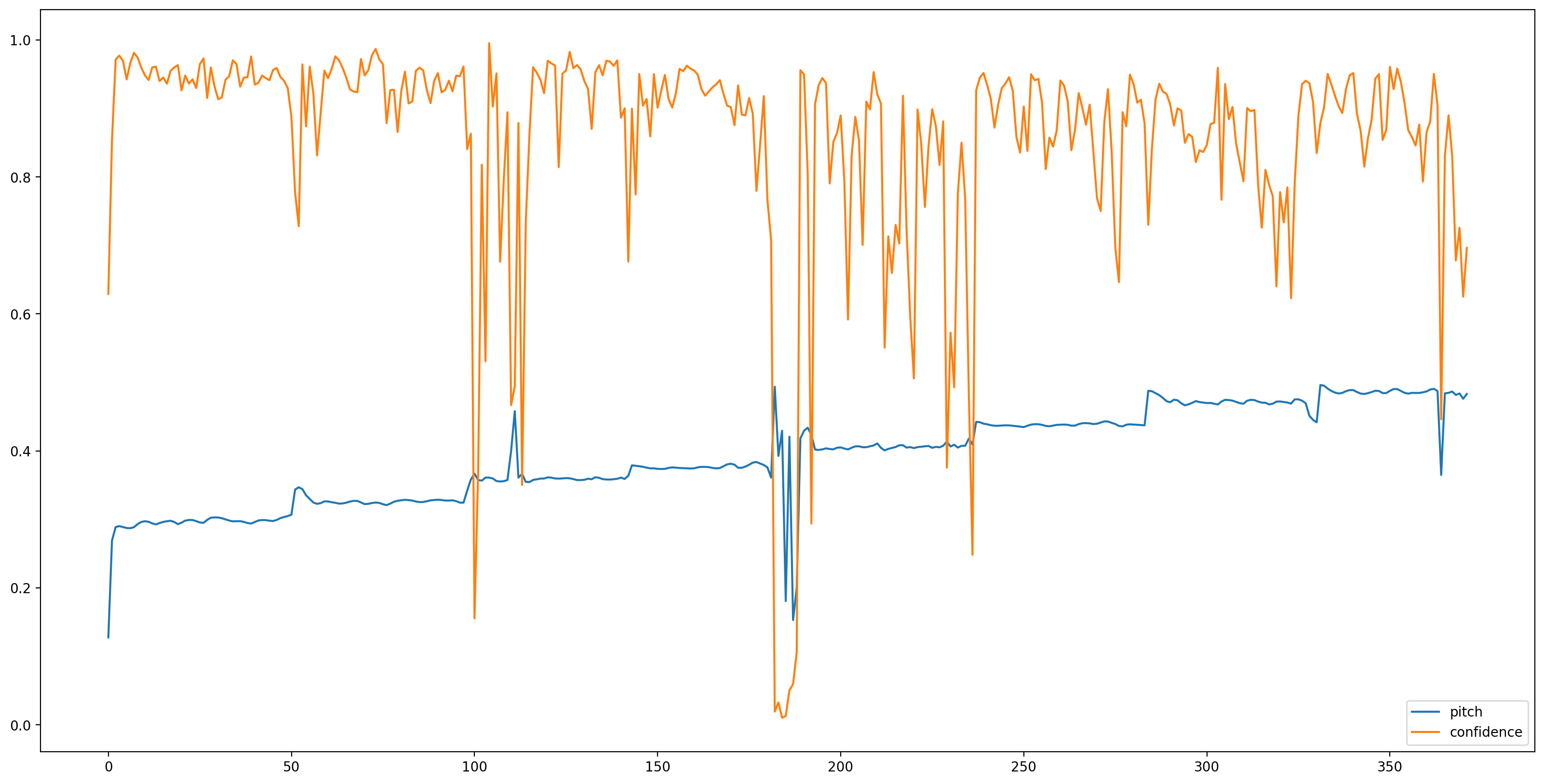
Hãy làm cho các kết quả dễ hiểu hơn bằng cách loại bỏ tất cả các ước tính cao độ có độ tin cậy thấp (độ tin cậy <0,9) và vẽ biểu đồ các ước lượng còn lại.
confidence_outputs = list(confidence_outputs)
pitch_outputs = [ float(x) for x in pitch_outputs]
indices = range(len (pitch_outputs))
confident_pitch_outputs = [ (i,p)
for i, p, c in zip(indices, pitch_outputs, confidence_outputs) if c >= 0.9 ]
confident_pitch_outputs_x, confident_pitch_outputs_y = zip(*confident_pitch_outputs)
fig, ax = plt.subplots()
fig.set_size_inches(20, 10)
ax.set_ylim([0, 1])
plt.scatter(confident_pitch_outputs_x, confident_pitch_outputs_y, )
plt.scatter(confident_pitch_outputs_x, confident_pitch_outputs_y, c="r")
plt.show()
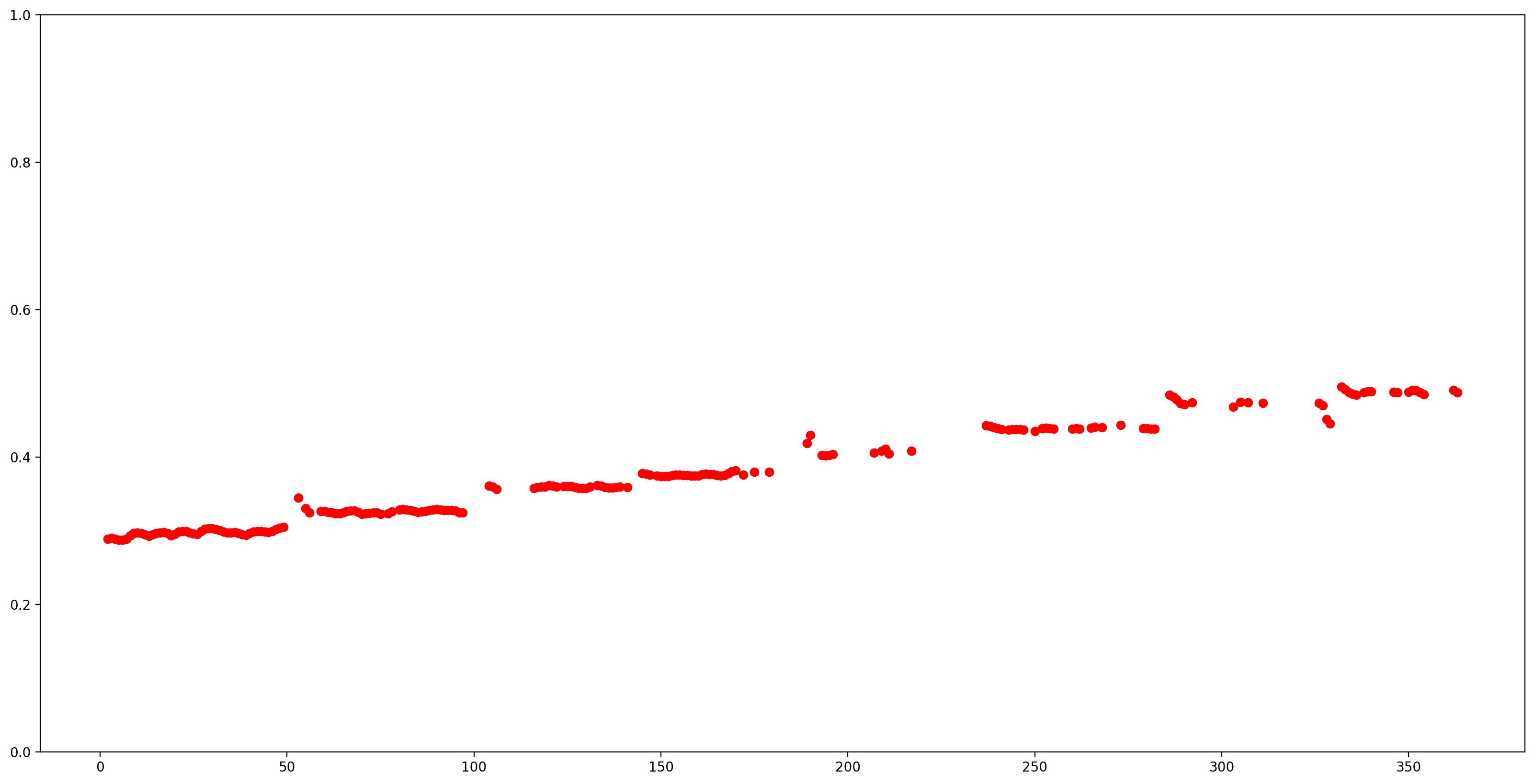
Các giá trị cao độ do SPICE trả về nằm trong khoảng từ 0 đến 1. Hãy chuyển chúng thành giá trị cao độ tuyệt đối tính bằng Hz.
def output2hz(pitch_output):
# Constants taken from https://tfhub.dev/google/spice/2
PT_OFFSET = 25.58
PT_SLOPE = 63.07
FMIN = 10.0;
BINS_PER_OCTAVE = 12.0;
cqt_bin = pitch_output * PT_SLOPE + PT_OFFSET;
return FMIN * 2.0 ** (1.0 * cqt_bin / BINS_PER_OCTAVE)
confident_pitch_values_hz = [ output2hz(p) for p in confident_pitch_outputs_y ]
Bây giờ, chúng ta hãy xem dự đoán tốt như thế nào: Chúng tôi sẽ phủ các cao độ dự đoán trên biểu đồ quang phổ ban đầu. Để làm cho các dự đoán cao độ hiển thị rõ ràng hơn, chúng tôi đã thay đổi biểu đồ quang phổ thành màu đen và trắng.
plot_stft(audio_samples / MAX_ABS_INT16 ,
sample_rate=EXPECTED_SAMPLE_RATE, show_black_and_white=True)
# Note: conveniently, since the plot is in log scale, the pitch outputs
# also get converted to the log scale automatically by matplotlib.
plt.scatter(confident_pitch_outputs_x, confident_pitch_values_hz, c="r")
plt.show()
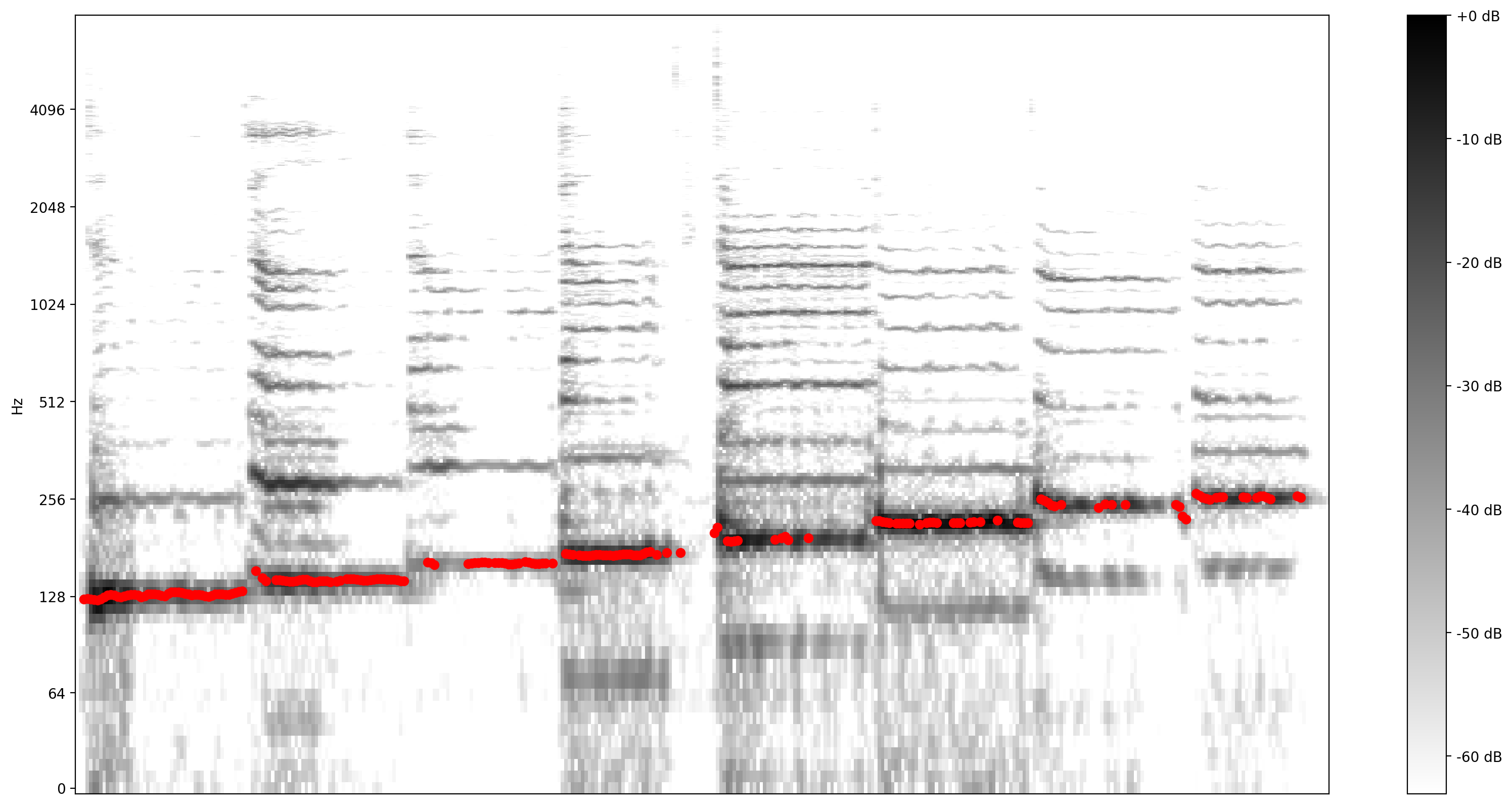
Chuyển đổi sang các nốt nhạc
Bây giờ chúng ta đã có các giá trị cao độ, hãy chuyển chúng thành nốt nhạc! Đây là một phần thách thức của chính nó. Chúng ta phải tính đến hai điều:
- phần còn lại (khi không có ca hát)
- kích thước của mỗi nốt nhạc (hiệu số)
1: Thêm số không vào đầu ra để cho biết khi nào không có tiếng hát
pitch_outputs_and_rests = [
output2hz(p) if c >= 0.9 else 0
for i, p, c in zip(indices, pitch_outputs, confidence_outputs)
]
2: Thêm phần bù ghi chú
Khi một người hát tự do, giai điệu có thể có sự bù trừ với các giá trị cao độ tuyệt đối mà các nốt có thể đại diện. Do đó, để chuyển đổi các dự đoán thành ghi chú, người ta cần phải sửa cho phần bù có thể có này. Đây là những gì mã sau đây tính toán.
A4 = 440
C0 = A4 * pow(2, -4.75)
note_names = ["C", "C#", "D", "D#", "E", "F", "F#", "G", "G#", "A", "A#", "B"]
def hz2offset(freq):
# This measures the quantization error for a single note.
if freq == 0: # Rests always have zero error.
return None
# Quantized note.
h = round(12 * math.log2(freq / C0))
return 12 * math.log2(freq / C0) - h
# The ideal offset is the mean quantization error for all the notes
# (excluding rests):
offsets = [hz2offset(p) for p in pitch_outputs_and_rests if p != 0]
print("offsets: ", offsets)
ideal_offset = statistics.mean(offsets)
print("ideal offset: ", ideal_offset)
offsets: [0.2851075707500712, 0.3700368844097355, 0.2861639241998972, 0.19609005646164235, 0.17851737247163868, 0.27334483073408933, -0.4475316266590852, -0.24651997073237908, -0.1796558047706398, -0.23060136331860548, -0.3782634107643901, -0.4725100625926686, -0.3457194541269999, -0.2436666886383776, -0.1818906877810207, -0.1348077739650435, -0.24551812662426897, -0.4454903457934165, -0.3126792745167535, -0.12241723670307181, -0.06614479972665066, -0.06702634735648871, -0.1744135098034576, -0.29365551425759406, -0.32520890458170726, -0.056438377636119696, 0.1470525135224534, 0.17167006002122775, 0.16529246704037348, 0.09569531546290477, -0.006323616641203955, -0.11799822075907684, -0.18835098459069144, -0.17934754504506145, -0.17215419157092526, -0.23695828034226452, -0.34594501002376177, -0.39380045278613807, -0.2528674895936689, -0.11009248657768467, -0.07118597401920113, -0.08042248799149121, -0.12799598588293293, -0.16227484329287023, -0.05931985421721464, 0.10667800800259641, 0.21044687793906292, 0.2931939382975841, -0.22329278631751492, -0.12365553720538003, -0.4571117360765271, -0.34864566459005175, -0.35947798653189267, -0.4313175396496476, -0.4818928106004421, 0.44220950977261, 0.45883109973128455, -0.47095522924010425, -0.3674495078498552, -0.3047186536962201, -0.31075979246441676, -0.4501382996017185, 0.3966096259778311, 0.4238116671269694, 0.4982676686471237, -0.45932030423227843, -0.4890504510576079, 0.3836871527260044, 0.4441304941600137, -0.38787359430138935, -0.24855899466817277, -0.20666386647764057, -0.23811575664822726, -0.2760223047310504, -0.3641714288169524, -0.41670903606955534, -0.41009272976462086, -0.3340427999073796, -0.26122959716860805, -0.2232610212141708, -0.19940660549943345, -0.22528914465252825, -0.2780899004513415, -0.2744434134537457, -0.25654931231085953, -0.33068201704567457, -0.4678933079416083, -0.4695135511333177, -0.1648153518015647, -0.24618840082233362, -0.48052406086269883, -0.3771743489677135, -0.32261801643912236, -0.25560347987954657, -0.24629741950576545, -0.14035005553309787, -0.16659160448853783, -0.2442749349648139, -0.236978201704666, -0.20882506652418442, -0.22637331529204374, -0.29836135937516417, -0.39081484182421633, -0.3909877680117404, -0.3650093676025108, -0.2642347521955202, -0.13023199393098395, -0.18214744283501716, -0.3020867909366345, -0.33754229827467697, -0.34391801162306024, -0.31454499496763333, -0.26713502510135356, -0.2910439501578139, -0.11686573876684037, -0.1673094354445226, -0.24345334692542053, -0.30852998240535356, -0.35647376789395935, -0.37154654069487236, -0.3600149954730796, -0.2667062802488047, -0.21902000440899627, -0.2484456507736752, -0.2774107871825038, -0.2941432754570741, -0.31118778272216474, -0.32662896348779213, -0.3053947554403962, -0.2160201109821145, -0.17343703730647775, -0.17792559965198507, -0.19880643679444177, -0.2725068260604502, -0.3152120758468442, -0.28217377586905457, -0.11595223738495974, 0.0541902144377957, 0.11488166735824024, -0.2559698195630773, 0.01930235610660702, -0.002236352401425279, 0.4468796487277231, 0.15514959977323883, 0.4207694853966899, 0.3854474319642236, 0.4373497234409598, -0.4694994504625001, -0.3662719146782649, -0.20354085369650932, -0.015043790774988963, -0.4185651697093675, -0.17896653874461066, -0.032896162706066434, -0.061098168330843805, -0.1953772325689087, -0.2545198683315988, -0.3363741032654488, -0.39191536320988973, -0.36531668408458984, -0.3489657612020167, -0.35455202891175475, -0.38925192399566555, 0.48781635300571935, -0.2820884378129733, -0.241939488189864, -0.24987341685836384, -0.3034880535179809, -0.2910712014014081, -0.2783103765422581, -0.30017802073304267, -0.23735882385318519, -0.15802705569807785, -0.1688725350672513, 0.00533368216211727, -0.2545762573057857, -0.28210347487274845, -0.29791870250051034, -0.3228369901949648, -0.3895802937323367, 0.4323827980583488, 0.17439196334535723, -0.12961039467398905, -0.2236296109730489, -0.04022635205333813, -0.4264043621594098, -0.0019025255615048309, -0.07466309859101727, -0.08665327413623203, -0.08169104440753472, -0.31617519541327965, -0.47420548422877573, 0.1502044753855003, 0.30507923857624064, 0.031032583278971515, -0.17852388186996393, -0.3371347884709195, -0.41780861421172233, -0.2023933346444835, -0.10604901297633518, -0.10771248771493447, -0.16037790997569346, -0.18698410763089868, -0.17355977250879562, -0.008242337244190878, -0.011401999431292609, -0.1876701734835322, -0.3601715640598968, 0.011681766969516616, -0.1931417836124183] ideal offset: -0.16889341450193418
Bây giờ chúng ta có thể sử dụng một số phỏng đoán để thử và ước tính chuỗi các nốt nhạc đã được hát. Độ lệch lý tưởng được tính ở trên là một thành phần - nhưng chúng ta cũng cần biết tốc độ (có bao nhiêu dự đoán tạo ra, chẳng hạn như một phần tám?), Và khoảng thời gian để bắt đầu lượng tử hóa. Để đơn giản, chúng tôi sẽ chỉ thử các tốc độ và hiệu số thời gian khác nhau và đo lỗi lượng tử hóa, cuối cùng sử dụng các giá trị giảm thiểu lỗi này.
def quantize_predictions(group, ideal_offset):
# Group values are either 0, or a pitch in Hz.
non_zero_values = [v for v in group if v != 0]
zero_values_count = len(group) - len(non_zero_values)
# Create a rest if 80% is silent, otherwise create a note.
if zero_values_count > 0.8 * len(group):
# Interpret as a rest. Count each dropped note as an error, weighted a bit
# worse than a badly sung note (which would 'cost' 0.5).
return 0.51 * len(non_zero_values), "Rest"
else:
# Interpret as note, estimating as mean of non-rest predictions.
h = round(
statistics.mean([
12 * math.log2(freq / C0) - ideal_offset for freq in non_zero_values
]))
octave = h // 12
n = h % 12
note = note_names[n] + str(octave)
# Quantization error is the total difference from the quantized note.
error = sum([
abs(12 * math.log2(freq / C0) - ideal_offset - h)
for freq in non_zero_values
])
return error, note
def get_quantization_and_error(pitch_outputs_and_rests, predictions_per_eighth,
prediction_start_offset, ideal_offset):
# Apply the start offset - we can just add the offset as rests.
pitch_outputs_and_rests = [0] * prediction_start_offset + \
pitch_outputs_and_rests
# Collect the predictions for each note (or rest).
groups = [
pitch_outputs_and_rests[i:i + predictions_per_eighth]
for i in range(0, len(pitch_outputs_and_rests), predictions_per_eighth)
]
quantization_error = 0
notes_and_rests = []
for group in groups:
error, note_or_rest = quantize_predictions(group, ideal_offset)
quantization_error += error
notes_and_rests.append(note_or_rest)
return quantization_error, notes_and_rests
best_error = float("inf")
best_notes_and_rests = None
best_predictions_per_note = None
for predictions_per_note in range(20, 65, 1):
for prediction_start_offset in range(predictions_per_note):
error, notes_and_rests = get_quantization_and_error(
pitch_outputs_and_rests, predictions_per_note,
prediction_start_offset, ideal_offset)
if error < best_error:
best_error = error
best_notes_and_rests = notes_and_rests
best_predictions_per_note = predictions_per_note
# At this point, best_notes_and_rests contains the best quantization.
# Since we don't need to have rests at the beginning, let's remove these:
while best_notes_and_rests[0] == 'Rest':
best_notes_and_rests = best_notes_and_rests[1:]
# Also remove silence at the end.
while best_notes_and_rests[-1] == 'Rest':
best_notes_and_rests = best_notes_and_rests[:-1]
Bây giờ chúng ta hãy viết các nốt đã được lượng tử hóa dưới dạng bản nhạc!
Để làm điều đó, chúng tôi sẽ sử dụng hai thư viện: music21 và mở Tờ nhạc hiển thị
# Creating the sheet music score.
sc = music21.stream.Score()
# Adjust the speed to match the actual singing.
bpm = 60 * 60 / best_predictions_per_note
print ('bpm: ', bpm)
a = music21.tempo.MetronomeMark(number=bpm)
sc.insert(0,a)
for snote in best_notes_and_rests:
d = 'half'
if snote == 'Rest':
sc.append(music21.note.Rest(type=d))
else:
sc.append(music21.note.Note(snote, type=d))
bpm: 78.26086956521739
[Chạy cái này] Chức năng trợ giúp để sử dụng Open Sheet Music Display (mã JS) để hiển thị bản nhạc
from IPython.core.display import display, HTML, Javascript
import json, random
def showScore(score):
xml = open(score.write('musicxml')).read()
showMusicXML(xml)
def showMusicXML(xml):
DIV_ID = "OSMD_div"
display(HTML('<div id="'+DIV_ID+'">loading OpenSheetMusicDisplay</div>'))
script = """
var div_id = { {DIV_ID} };
function loadOSMD() {
return new Promise(function(resolve, reject){
if (window.opensheetmusicdisplay) {
return resolve(window.opensheetmusicdisplay)
}
// OSMD script has a 'define' call which conflicts with requirejs
var _define = window.define // save the define object
window.define = undefined // now the loaded script will ignore requirejs
var s = document.createElement( 'script' );
s.setAttribute( 'src', "https://cdn.jsdelivr.net/npm/opensheetmusicdisplay@0.7.6/build/opensheetmusicdisplay.min.js" );
//s.setAttribute( 'src', "/custom/opensheetmusicdisplay.js" );
s.onload=function(){
window.define = _define
resolve(opensheetmusicdisplay);
};
document.body.appendChild( s ); // browser will try to load the new script tag
})
}
loadOSMD().then((OSMD)=>{
window.openSheetMusicDisplay = new OSMD.OpenSheetMusicDisplay(div_id, {
drawingParameters: "compacttight"
});
openSheetMusicDisplay
.load({ {data} })
.then(
function() {
openSheetMusicDisplay.render();
}
);
})
""".replace('{ {DIV_ID} }',DIV_ID).replace('{ {data} }',json.dumps(xml))
display(Javascript(script))
return
# rendering the music score
showScore(sc)
print(best_notes_and_rests)
/tmpfs/src/tf_docs_env/lib/python3.7/site-packages/music21/musicxml/m21ToXml.py:465: MusicXMLWarning: <music21.stream.Score 0x7f276c652190> is not well-formed; see isWellFormedNotation() category=MusicXMLWarning)
<IPython.core.display.Javascript object> ['C3', 'D3', 'E3', 'F3', 'G3', 'A3', 'B3', 'C4']
Hãy chuyển đổi các nốt nhạc sang tệp MIDI và nghe nó.
Để tạo tệp này, chúng ta có thể sử dụng luồng chúng ta đã tạo trước đó.
# Saving the recognized musical notes as a MIDI file
converted_audio_file_as_midi = converted_audio_file[:-4] + '.mid'
fp = sc.write('midi', fp=converted_audio_file_as_midi)
wav_from_created_midi = converted_audio_file_as_midi.replace(' ', '_') + "_midioutput.wav"
print(wav_from_created_midi)
converted_audio_file.mid_midioutput.wav
Để nghe nó trên colab, chúng ta cần chuyển nó trở lại wav. Một cách dễ dàng để làm điều đó là sử dụng Timidity.
timidity $converted_audio_file_as_midi -Ow -o $wav_from_created_midi
Playing converted_audio_file.mid MIDI file: converted_audio_file.mid Format: 1 Tracks: 2 Divisions: 1024 Track name: Playing time: ~16 seconds Notes cut: 0 Notes lost totally: 0
Và cuối cùng, hãy nghe âm thanh, được tạo từ các nốt, được tạo qua MIDI từ các cao độ dự đoán, được suy ra bởi mô hình!
Audio(wav_from_created_midi)

